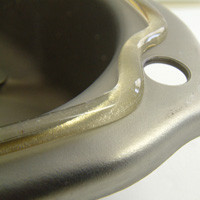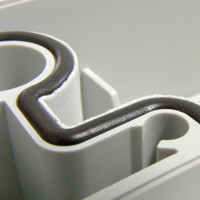DATRON Technology Package of reliable dispensing process of Electronic housing
Dispensing hotmelts & hot-melt adhesives
Hotmelts, also referred to as hot-melt adhesives, are used in almost all production areas. Typical application areas can be found in the automotive area, e.g. for gluing in the paper rolls in the oil filter housing, or in electrical engineering for the extrusion coating of components and electronics, as well as in furniture manufacturing and the textile industry.
Our volumetric dispensing systems are designed exactly for these applications and meet the increasing demands on the reproducibility of position, shape and dispensing volume of the applied adhesive, sealant or casting material. Patented dispensing heads with heatable gear wheel pump systems and their integration in the path control guarantee precise volume application, independent of the dispensing speed and flow properties of the material. Thus, all common hotmelts, like polyamides, polyurethane or e.g. polvoefine (reactive or non-reactive) can be processed at temperatures of up to 210°C.
The machines are completely 3D-capable, with which even freely formed surfaces can be optimally dispensed when one's own rotary axes are integrated. Depending on the customer's requirements, the dispensing material is fed to the pump unit via a tank melting system, or alternatively via a cartridge smelter. Coordinate tables 540 mm x 500 mm to 1.5 m x 2.5 m in size are available as a work area, as well as in-line-capable machine systems.
Process-sure casting of electronic assemblies
Compounds are resin systems which are used for casting, encapsulating or embedding electronic components, such as sensors, magnets, pumps and ignition systems. This makes the product group of compounds indispensable, not only for electrical engineering and electronics, but also for mechanical engineering and mold making, as well as for the cable industry. Compounds include oven- and room-temperature hardening epoxy resin systems, polyurethane, polybutadiene and silicone systems. They are for protecting against moisture and solvents, high or low temperatures and mechanical stress.
The volumetric dispensing systems from DATRON are setting new standards in the area of industrial dispensing technology, and are therefore meeting the increasing requirements for the reproducibility of position, shape and dispensing volume of the applied adhesive or casting material. Our highly precise dispensing systems ensure optimum production quality at the maximum level of process reliability. Here, the integration of the dispensing head in the path control guarantees that the applied amount has a precise volume, independent of dispensing speed and the flow properties of the material.

Process-sure dispensing of housing seals
Plastic and metal housings from the electronics or automotive area, as well as assemblies from the areas of telecommunication, consumer or household goods, are being increasingly sealed according to the "form in place" (FIP) method. Here, instead of inserting a conventional gasket (punched gasket, molded seal, endless product), the sealing mass is dispensed directly onto the component in its liquid state. The savings potential, thanks to the FIP method, is tremendous: No tool costs for component changes, no warehousing costs, no waste. The liquid seal immediately adheres to the component, so slipping is impossible. Transport security is automatic. Manual mounting by hand with all its imperfections and risks can therefore be avoided. Usually, fasteners, guides, webs and grooves aren't necessary.
The volumetric dispensing systems from DATRON are setting new standards in the area of industrial dispensing technology, and are therefore meeting the increasing requirements for the reproducibility of position, shape and dispensing volume of the applied adhesive or casting material. Our highly precise dispensing systems ensure optimum production quality at the maximum level of process reliability. Here, the integration of the dispensing head in the path control guarantees that the applied amount has a precise volume, independent of dispensing speed and the flow properties of the material.
Liquid seals
Electronic and mechanical assemblies are increasingly being sealed according to the "form in place" (FIP) method. Here, instead of inserting a conventional gasket (punched gasket, molded seal, endless product), the sealing mass is dispensed directly onto the component in its liquid state. The savings potential, thanks to the FIP method, is tremendous: No tool costs for component changes, no warehousing costs, no waste. The liquid seal immediately adheres to the component, so slipping is impossible. Transport security is automatic. Manual mounting by hand with all its imperfections and risks can therefore be avoided. Usually, fasteners, guides, webs and grooves aren't necessary.
The volumetric dispensing systems from DATRON are setting new standards in the area of industrial dispensing technology, and are therefore meeting the increasing requirements for the reproducibility of position, shape and dispensing volume of the applied adhesive or casting material. Our highly precise dispensing systems ensure optimum production quality at the maximum level of process reliability. Here, the integration of the dispensing head in the path control guarantees that the applied amount has a precise volume, independent of dispensing speed and the flow properties of the material.
Process-sure dispensing of sealing materials
On the part of production technology, the increasing miniaturization of industrial products brings about completely new challenges with regard to the series production of machine-dispensed liquid seals. Plastic and metal housings from the electronics or automotive area, as well as assemblies from the areas of telecommunication, consumer or household goods, are being increasingly sealed according to the "form in place" (FIP) method. Here, instead of inserting a conventional gasket (punched gasket, molded seal, endless product), the sealing mass is dispensed directly onto the component in its liquid state. Usually, silicones, polyurethanes, MS polymers or POP hybrid polymers are used as sealing materials.
The volumetric dispensing systems from DATRON are setting new standards in the area of industrial dispensing technology, and are therefore meeting the increasing requirements for the reproducibility of position, shape and dispensing volume of the applied adhesive or casting material. Our highly precise dispensing systems ensure optimum production quality at the maximum level of process reliability. Here, the integration of the dispensing head in the path control guarantees that the applied amount has a precise volume, independent of dispensing speed and the flow properties of the material.



